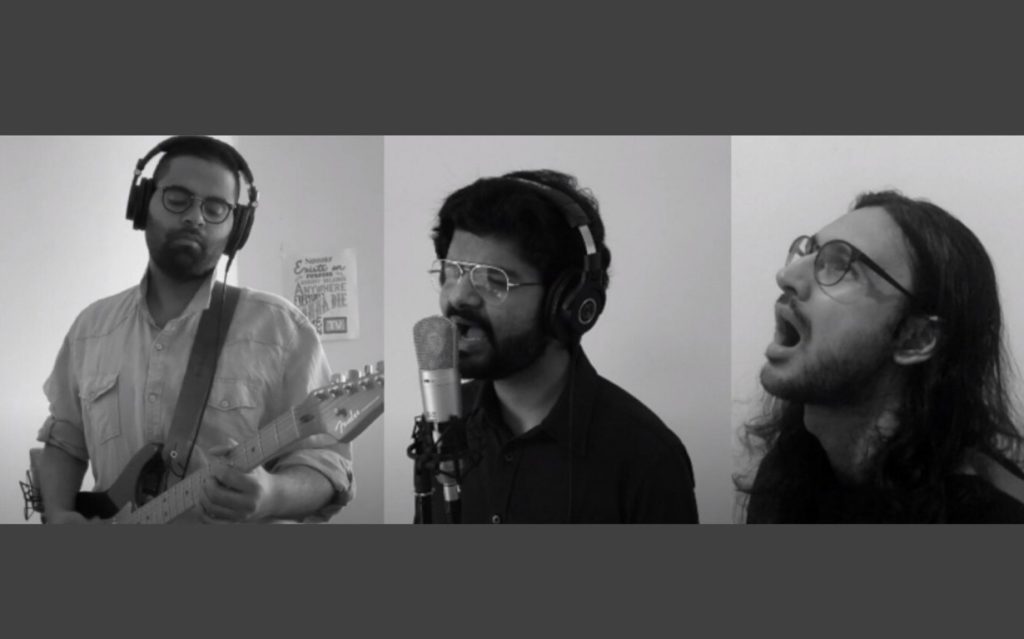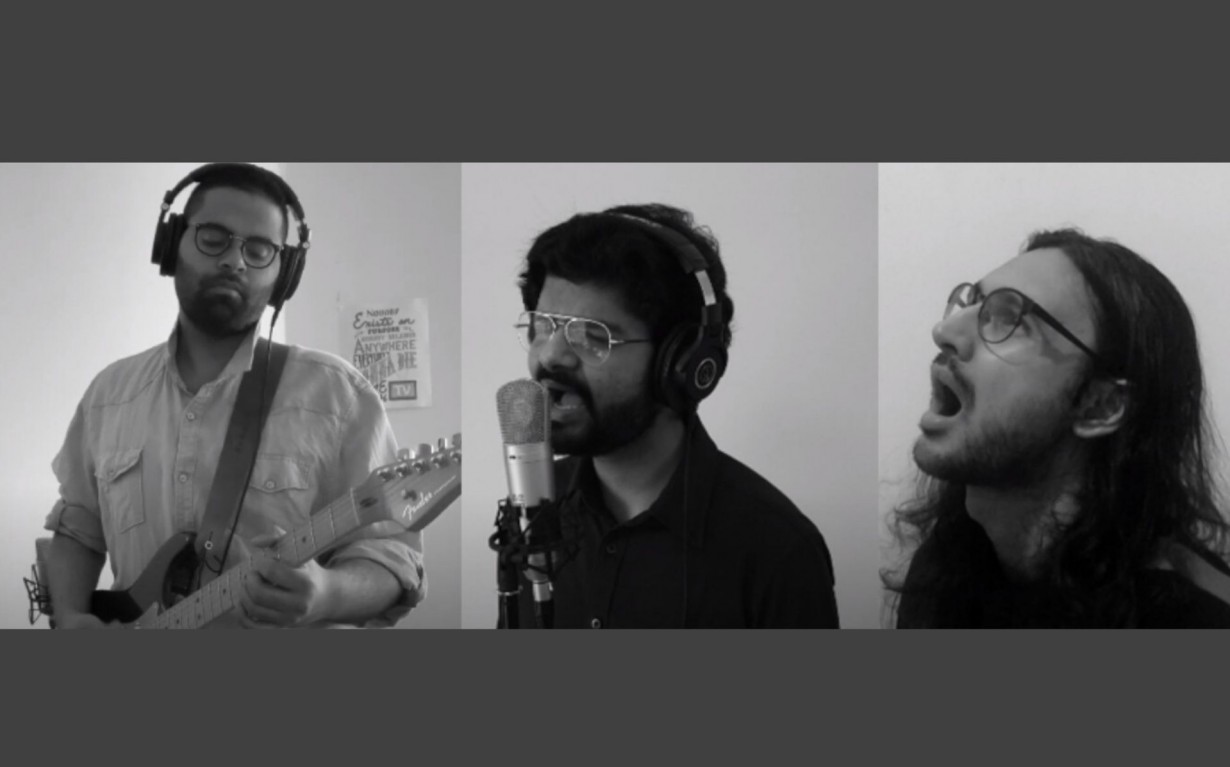
Sambhal Jaa – A Message For A Better Tomorrow
On the 15th of May, the up and coming band ‘Fjarsamband’ released their first song titled “Sambhal Jaa” (Be careful). This inspiring song strikes a note with the listeners as we face the crisis of pandemic and the increasing environmental threats together.
The song highlights the wake-up call we all need to stand up and act for humankind and nature.
For this environment day, we had a chance to interview Adbhut Gupta, Siddhant Bhardwaj, and Aditya Joshi – the band members of ‘Fjarsamband’ – as they talked about their song, what inspires them and the real warning of nature we should be listening to.
Can you explain what ‘Fjarsamband’ means and why did you decide to use it as the name of your band?
Adbhut : I think Aditya should answer that, he came up with that!
Aditya: We’ve been exchanging ideas through WhatsApp related to music for quite some time now. Since we’re all in different places, we had decided to name the group ‘Long Distance Relationship’.
A month ago, we thought that we should put out a song. So just before the song was released we thought about having an official band name but the name ‘Long Distance Relationship’ is too long and there were already a few bands with that name, so we thought we’d start looking for an alternative in other languages. We came up with ‘Fjarsamband’ which is Icelandic for the same meaning. It sounded really cool so we decided on that!
Your new song ‘Sambhal Jaa’ really stirs deep emotions, what message are you trying to convey through your music? And what impact do you wish this song and the lyrics will bring to the listeners?
Adbhut: While in lockdown, I had this idea for the song so I shared it with Siddhant and Aditya. We’re all seeing on the news how nature is healing while humans are in lockdown and this was ironic and that struck out to me. I started writing about this, and it kinda developed by itself.
The basic message of the song is that this is the time for humans to understand that whatever is happening is because of them. The environmental impact of humans is getting worse day by day. We want to draw attention to this particular thing that it’s time that we get careful otherwise this kind of thing will keep returning.
We keep on listening to this news on a daily basis about climate change and how it is happening everywhere around the world. We started thinking that maybe humans are the root cause of all evil so probably humans are the virus.
Your song itself is like a warning, ‘Sambhal Jaa’. What made you focus in this direction and what made you think that this is the warning that nature has given us?
Adbhut: I personally care about the environment a lot. I have been a vegan for about 3 years now. While I was under lockdown, I used to think about this irony that my hometown Ludhiana, in Punjab, which has been one of the most polluted cities in India, came to a point where its air quality was better than some places in the US which led me to think that humans are causing all these things. Now the air is pure, but we are not able to enjoy it as we’re wearing masks.
So it’s a warning for us humans and made me question whether the earth was better without us and if we have made the earth worse. It is time we take this warning pretty seriously because things are gonna get worse. It’s not gonna get better if we keep doing what we’re doing.
There is this part in the translated version of ‘Sambhal Jaa’
“There’s still a time to fix this mess, […] Nature will bring justice from time to time”.
In your opinion, how can we as an individual or a community ‘fix this mess’?
Adbhut: I think we have to start on an individual level. Everyone has to take responsibility somehow. I used to think that what would happen if one person became vegetarian or vegan? or stop using plastic products? What will be the contribution of a single individual? And how would it create an impact on a larger scale?
I have found that it does give an impact. For example, I’ve seen my friends start following some practices that I’ve been doing after seeing that I do it.
I live in Virginia, Blacksburg and I have been involved with an environmental organization here. We advocated to stop using the straws and Blacksburg is now straw-free! It has to start at the local level and I believe even small things can create global effects.
It has to start at the local level and I believe even small things can create global effects.
~ Adbhut
The lockdown has had a very interesting effect on the environment. We can see the impact we have on nature when we are out and about doing our thing.
After this pandemic ends, what changes are you expecting to see in the behavior of the people? Do you think people will realize that it is time for us to change ourselves?
Aditya: From a behavior aspect, people are definitely gonna be more careful but mostly for the sake of their own health. But the fact remains that we still need to work together to bring a positive impact to the environment, I think that needs to be reminded again, as it might take a backseat.
To add to Adbhut’s answer, as an individual at a very local level we are able to drive change. I think that this itself would be very powerful because you hear so many stories with respect to Earth5R as well, what started as a very small local initiative in Powai, has reached such a massive scale!
So, I think this is something that needs to be brought to light again and again that change starts from the individual.
Siddhant: You have to think about these things at an individual level because that’s what gets the ball rolling. The whole year has been a little bit of a wake-up call. I mean this entire year, think about what has been happening in India for the last month. We have a corona pandemic going on and you have the cyclone on one side and there was a locust attack on the other side.
So if anything, I would say this year has been in a way a year where I think you’re supposed to just sit up and realize that maybe you’ve been doing things wrong. And personally, I think once the corona situation dies down you will have a situation where a lot of people and the way they think about these things will fundamentally change. Things like climate change and the environment, and the way people have been thinking about it should change and will change.
I would say this year has been in a way a year where I think you’re supposed to just sit up and realize that maybe you’ve been doing things wrong. ~ Siddhant
A screenshot from Sambhal Jaa music video
The Italian poet Dante Alighieri had said, “Nature is the art of God.” Would you say you share the same sentiments?
Adbhut: It depends on what you think. For me, I don’t distinguish much between nature and god. I think that nature is something much bigger than us. It has been there always even if we weren’t there, nature would have been there. You can think of the idea of God as something that you don’t know, something that is there. So to me, nature itself is a God. If you don’t respect it, it will take revenge on you in its own way, and it will heal itself.
In your opinion, how big of a role can the music industry have in raising general public awareness or conveying important messages?
Aditya: I think they have a lot of parts to play because music is art but for most people music is entertainment and everyone looks for some sorts of entertainment. Music also got a pretty big reach and if it’s a special message that is being delivered with good quality music then that will be a really good way or medium to translate an important message to the people
If it’s a special message that is being delivered with good quality music then that will be a really good way or medium to translate an important message to the people.
~ Aditya
Adbhut: Recently, I have seen many people trying to make music to convey this message of the environment especially in this time of lockdown. Our motivation behind this song is also to convey this message that it is a warning to humans. So, I think music was the best way to portray these messages. To add, people like our song because it has this message. People like the message more than the song, if you convey the message through music it gets to people.
Siddhant: As a band, one of the things we’re already conscious about and are trying to do is that we don’t want our music to be just another love song and whatnot – that isn’t to say that we’re not gonna do it ever! But my point is that there are these things that always exist and yet music, in general, isn’t necessarily talking about these things as much as it could. So that’s one of the things we could potentially highlight here as a band. It can be a little of a conscious story, even on the next song we’re working on right now you’ll see that it’s again a non-traditional topic that we have picked up.
A screenshot from Sambhal Jaa music video
Will you be exploring similar themes for your next songs in the future?
Yes, we might touch up on a lot of different subjects and we will definitely want to continue sending a message that is very relevant to the planet and the community.
We saw from your social media account that you’re working with Muddy Hands to promote environmental awareness. Can you tell us more about it?
So Muddy Hands is a company in India that wants to bring nature into your home as cities are becoming more and more of a concrete jungle. They offer products to create your own garden spaces within your home. It felt like a really good match because we’re touching upon a similar theme. Though ours is more of a warning!
World Environment Day is coming up and it felt like a really good way to collaborate and it sends the same message in an even stronger way.
As the theme/goal of the Muddy Hands and yours is that you want the people to be involved as an individual to help the environment. Would you say individual involvement for self-sustainability should be the focus in future or are the community initiative enough?
Aditya: I think there is no ‘one’ thing we should be focusing on. We shouldn’t only promote just one act as both are equally important even from different points of view. Self-sustainability is beneficial from the smallest unit locality which you can call your own home, and the actual community-related work like recycling and cleanups are probably more beneficial from a locality point of view. So it’s maybe just different parts of the same problem.
Do you have a message for our readers?
Shambal jaa! Take it as a warning
Sambhal Jaa is a melodious warning which is sure to tug at your heartstrings. As the pandemic eases out and we move forward the message Fjarsamband has conveyed will resonate with us.
There is still a time to fix this mess, To get ahead of one’s selfishness
Be sure to check out Fjarsamband on YouTube, Instagram, and Facebook
ABOUT EARTH5R
Earth5R is an environmental organization from India with its head office at Mumbai. It works with the NGO sector, Companies and helps them conduct environmental corporate social responsibility (CSR) programs across India. Earth5R specializes in circular economy based projects. Earth5R also offers short term and long term environmental courses.
Earth5R is conducting large-scale online training on COVID 19 Coronavirus prevention, response, management, and self-sustainability. These trainings are conducted on digital platforms in regional languages across India and other countries.
Earth5R’s Global Sustainability Hub is a cross-sector and cross-country collaboration in pursuit of UN Sustainable Development Goals. It is an excellent opportunity for governments and the private sector to engage with communities, use Sustainability-based models to drive economic changes and create social and environmental impact.
– Interview conducted by Shafa Azzahra and Riya Dani



